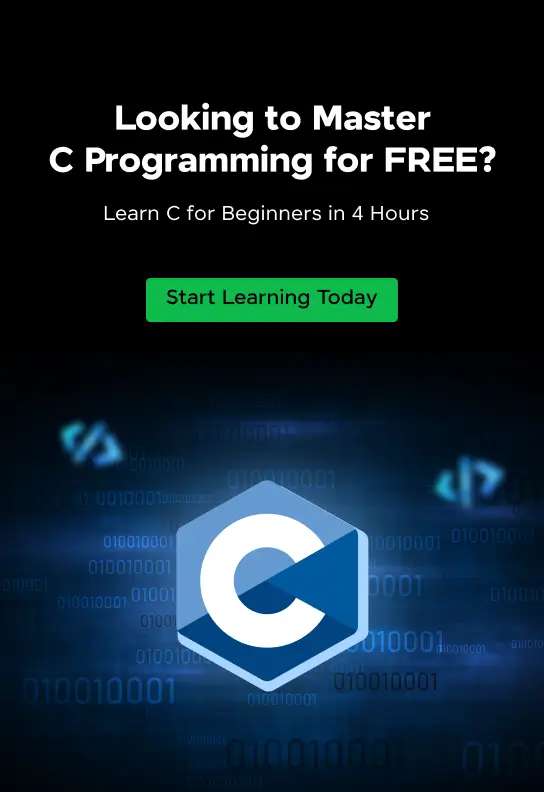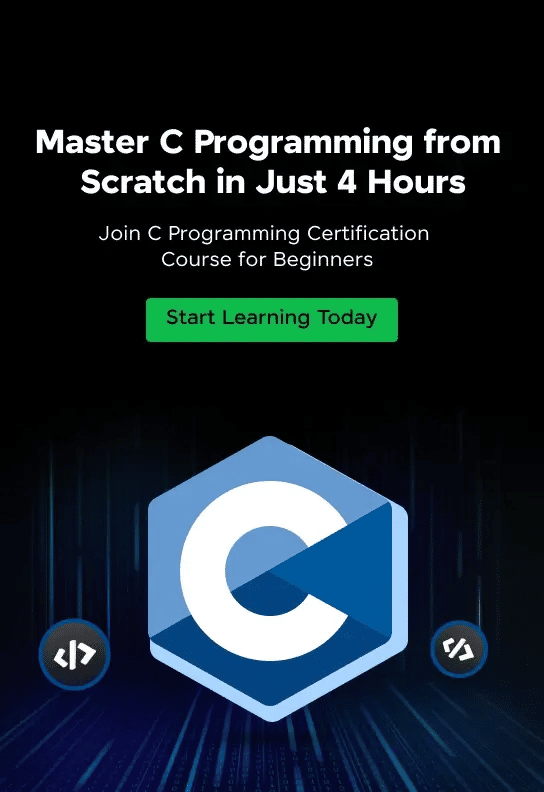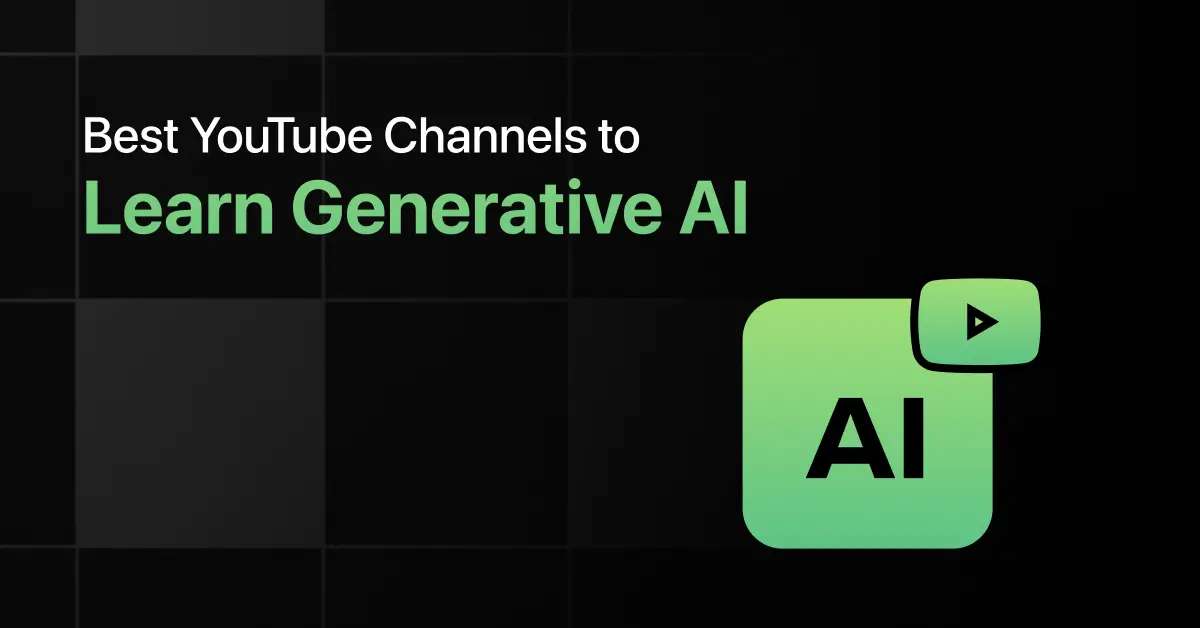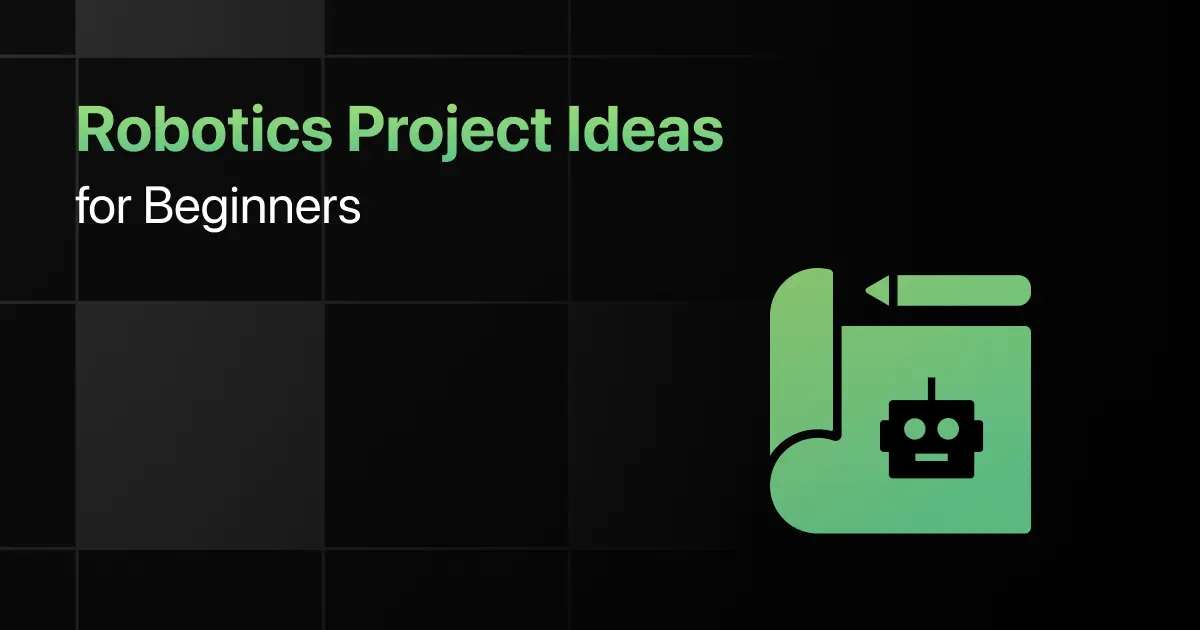Best Websites to Learn C Programming
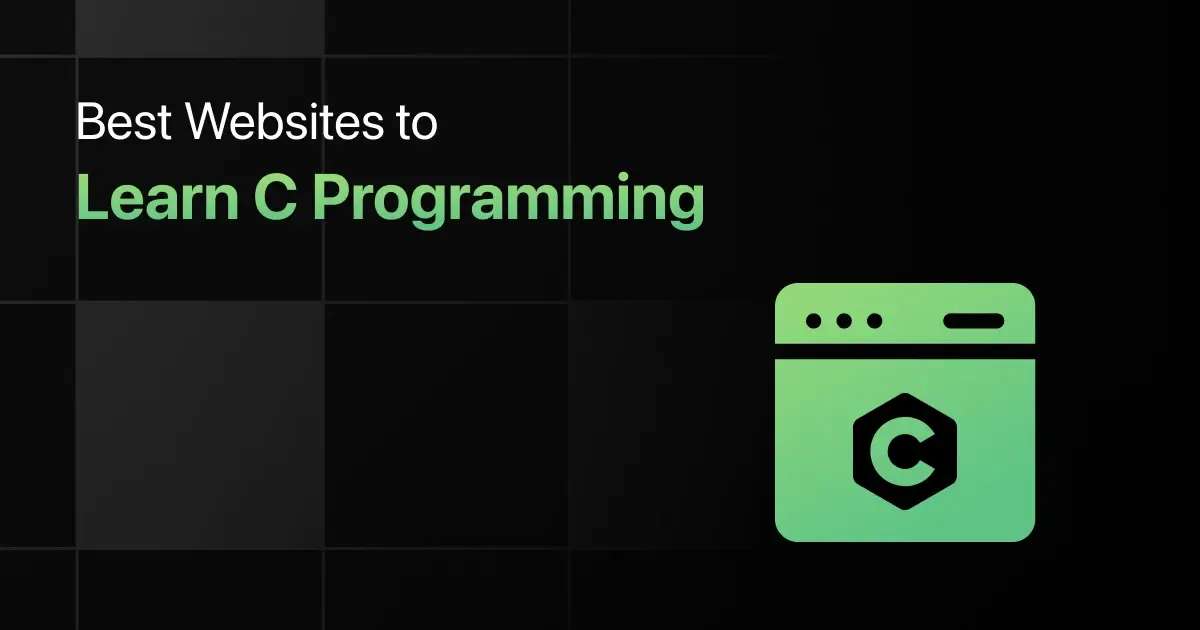
Curious about the world of C programming but not sure where to start without spending money? Good news!
The best websites to learn C programming for free are out there, ready to guide you through the fundamentals of this foundational language at no cost.
10 Best Websites for C Programming – Overview
Here’s an overview of the top 10 websites to learn C Programming:
| S.No. | Website Name | Course Duration | Pricing | Certification | Website Link |
|---|---|---|---|---|---|
| 1 | GUVI | 4 hours | Freemium | Yes | Visit Now |
| 2 | Coursera | 5 months | Freemium | Yes | Visit Now |
| 3 | Learn-C.org | Self-paced | Free | No | Visit Now |
| 4 | Udemy | 4 hours | Paid | Yes | Visit Now |
| 5 | Alison | 10-15 hours | Free | Yes | Visit Now |
| 6 | Codeforwin | Self-paced | Free | No | Visit Now |
| 7 | W3Schools | Self-paced | Free | No | Visit Now |
| 8 | Class Central | 5 weeks | Freemium | Yes | Visit Now |
| 9 | edX | 5 weeks | Freemium | Yes | Visit Now |
| 10 | Codecademy | 10 hours | Paid | Yes | Visit Now |
Best Websites to Learn C Programming for Beginners
Below is the list of best websites to learn C Programming for beginners:
1. GUVI
GUVI’s “C Programming for Beginners” course is a comprehensive online program designed to teach the fundamentals of C programming.
It covers essential topics such as Scope and Lifetime, Operators, Branching and Loops, Command line arguments, File operations, and Preprocessor directives. Learners can apply their knowledge through various exercises on GUVI’s gamified practice platforms.
Upon completion, they can obtain a globally recognized certification from the National Skill Development Corporation (NSDC) for a nominal fee.
Course Diversity: Covers fundamental C programming concepts for beginners.
Learning Style: Self-paced with interactive exercises and gamified practice.
Pricing Structure: Free access to the course, fee for certification.
Platform Usability: User-friendly with dedicated forum support.
Certifications Offered: NSDC certification available at a nominal fee.
Language Options: Course available in English.
Instructor Expertise: Taught by industry experts with years of experience.
Duration of Courses: 4 hours of recorded content.
Community and Support: Access to gamified practice platforms and dedicated forum support.
2. Coursera
The “Introductory C Programming” specialization on Coursera, offered by Duke University, is a comprehensive program designed to teach fundamental programming skills using the C language.
It consists of four courses that cover software engineering, computer programming, algorithms, problem-solving, debugging, and the software development process. The specialization provides a systematic approach to learning C programming, from basic syntax and data structures to advanced concepts like memory management and system interactions.
Learners will engage in hands-on projects, including writing a sorting algorithm and using Monte Carlo simulation to calculate poker hand probabilities.
Course Diversity: Covers fundamental to advanced C programming concepts.
Learning Style: Structured learning with hands-on projects and problem-solving.
Pricing Structure: Accessible through Coursera subscription, financial aid available.
Platform Usability: User-friendly platform with flexible learning schedule.
Certifications Offered: Shareable certificate upon completion of the specialization.
Language Options: Content available in English with subtitles in 20 languages.
Instructor Expertise: Courses taught by faculty from Duke University.
Duration of Courses: Approximately 5 months at 10 hours a week.
Community and Support: Access to Coursera’s community of learners and developers.
3. Learn-C.org
Learn-C.org is an interactive and user-friendly platform dedicated to teaching the C programming language.
The website offers a series of tutorials that cover the basics of C programming, including “Hello, World!”, variables, types, arrays, conditions, strings, loops, and functions. It also delves into more advanced topics such as pointers, structures, dynamic allocation, recursion, linked lists, and binary trees.
The tutorials are structured to be easy to follow, with practical exercises that allow learners to write and test code directly in the browser.
Course Diversity: Covers a range of topics from C basics to advanced concepts.
Learning Style: Interactive tutorials with in-browser coding exercises.
Pricing Structure: Free access to all tutorial content.
Platform Usability: Simple and easy-to-navigate interface.
Certifications Offered: Does not specify certifications for this tutorial.
Language Options: Content primarily in English.
Instructor Expertise: Content developed by programming experts.
Duration of Courses: Self-paced, time varies depending on the learner’s schedule.
Community and Support: Does not specify community or support options.
4. Udemy
“C Programming For Beginners – Master the C Language” on Udemy is a comprehensive course designed to introduce learners to the C programming language. Created by Tim Buchalka’s Learn Programming Academy and Jason Fedin, this course is ideal for those new to programming.
It covers fundamental concepts such as variables, data types, control flow, and pointers, as well as more advanced topics like memory management and software engineering principles. The course includes 4.4 hours of on-demand video, articles, and downloadable resources, making it a thorough resource for mastering C.
Course Diversity: Covers fundamental to advanced C programming concepts.
Learning Style: Video-based learning with practical coding exercises.
Pricing Structure: Individually priced, with frequent discounts available.
Platform Usability: User-friendly interface with easy access to course materials.
Certifications Offered: Certificate of completion provided.
Language Options: Content available in English, with subtitles in multiple languages.
Instructor Expertise: Course created by experienced instructors with a background in software development.
Duration of Courses: 4.4 hours of on-demand video content.
Community and Support: Udemy platform offers Q&A sections and community forums.
5. Alison
The “Diploma in C Programming” course on Alison is a free online program designed to introduce learners to the C programming language.
This course is ideal for beginners and covers a broad range of topics, including the basics of programming, binary and hexadecimal systems, programming concepts, and the fundamentals of the C language. It delves into various aspects of C programming, such as variables, data types, control structures, functions, arrays, and pointers.
The course also includes modules on how programming works, program flow, and writing your first program. Upon completion, learners can obtain a diploma certification.
Course Diversity: Covers fundamental concepts and applications of C programming.
Learning Style: Online, self-paced learning with a mix of video lectures and readings.
Pricing Structure: Free access to the course.
Platform Usability: User-friendly and accessible online platform.
Certifications Offered: Diploma certification available upon course completion.
Language Options: Content available in English.
Instructor Expertise: Course provided by Advance Learning – IT.
Duration of Courses: Estimated 10-15 hours of learning.
Community and Support: Does not specify community or support options.
6. Codeforwin
Codeforwin’s C programming section is a comprehensive resource dedicated to teaching the C programming language.
It covers a wide range of topics, starting with an introduction to C programming, explaining its history and significance. The tutorials progress through various aspects of C programming, including how to compile C programs, understanding basic syntax, variables, data types, operators, control statements, loops, functions, arrays, and pointers.
The course also delves into more advanced topics like dynamic memory allocation, file handling, and data structures. Each topic is explained in detail with examples and code snippets, making it easier for learners to grasp complex concepts.
Course Diversity: Covers a wide range of C programming topics, from basics to advanced.
Learning Style: Text-based tutorials with examples and code snippets.
Pricing Structure: Free access to all tutorial content.
Platform Usability: Well-organized and easy to navigate.
Certifications Offered: Does not specify certifications for this tutorial.
Language Options: Content primarily in English.
Instructor Expertise: Content developed by Pankaj, an experienced programmer.
Duration of Courses: Self-paced, time varies depending on the learner’s schedule.
Community and Support: Does not specify community or support options.
7. W3Schools
W3Schools offers a comprehensive C tutorial that is ideal for beginners and intermediate learners looking to understand the C programming language.
It covers fundamental concepts such as basic syntax, variables, data types, operators, control statements, loops, functions, arrays, and pointers. The tutorial also includes more advanced topics like memory management and file handling.
W3Schools’ unique “Try it Yourself” editor allows learners to edit C code and view the results in their browser, enhancing the hands-on learning experience.
Course Diversity: Covers a wide range of C programming topics, from basics to advanced.
Learning Style: Interactive, with a “Try it Yourself” editor for hands-on practice.
Pricing Structure: Free access to all tutorial content.
Platform Usability: User-friendly and easy to navigate.
Certifications Offered: Does not specify certifications for this tutorial.
Language Options: Content primarily in English.
Instructor Expertise: Content developed by experienced C++ professionals.
Duration of Courses: Self-paced, time varies depending on the learner’s schedule.
Community and Support: Does not specify community or support options.
8. Class Central
“C for Everyone: Programming Fundamentals” is a course offered by the University of California, Santa Cruz, through Coursera and featured on Class Central.
It emphasizes the universal value of coding skills in today’s world, where algorithms are prevalent across various fields.
The course covers the history of the C language, its lexical elements, data types, flow of control, functions, recursion, arrays, and pointers.
It is structured to provide a deep understanding of computing processes at a fundamental level, making it well-suited for scientists, artists, humanists, and anyone interested in understanding how algorithms work.
Course Diversity: Fundamental C programming concepts for a broad audience.
Learning Style: Structured learning with a focus on the history and fundamentals of C.
Pricing Structure: Free online course with an option for a paid certificate.
Platform Usability: Accessible through Coursera, offering a user-friendly learning experience.
Certifications Offered: Paid certificate available upon completion.
Language Options: Content available in English with subtitles in multiple languages.
Instructor Expertise: Taught by Ira Pohl from the University of California, Santa Cruz.
Duration of Courses: Estimated 5 hours a week for five weeks.
Community and Support: Access to Coursera’s community and support resources.
9. edX
The “C Programming: Getting Started” course, provided by Dartmouth College on edX, is an introductory program aimed at teaching the fundamentals of the C programming language.
It covers essential topics such as software and hardware, computer programs and algorithms, variables, data types, and basic programming constructs like loops and functions. The course is structured to provide a solid foundation in C programming, emphasizing hands-on learning with practical exercises.
It is part of the “C Programming with Linux Professional Certificate” program and is a great starting point for anyone interested in learning C programming.
Course Diversity: Introductory course covering fundamental C programming concepts.
Learning Style: Structured learning with hands-on exercises and practical applications.
Pricing Structure: Free to enroll with an optional upgrade available for a certificate.
Platform Usability: User-friendly platform with courses from top universities.
Certifications Offered: Optional paid certificate available upon completion.
Language Options: Content available in English with video transcripts in English.
Instructor Expertise: Taught by experienced faculty from Dartmouth College.
Duration of Courses: Estimated 2-4 hours per week for 5 weeks.
Community and Support: Access to edX’s community of learners and developers.
10. Codecademy
Codecademy’s “Learn C” path is a beginner-friendly skill path designed to introduce learners to the C programming language. This path is comprehensive, including various aspects of C programming such as basics, control flow, and more.
It is structured to provide learners with key programming concepts, enabling them to write their own C programs, use pointers to work with memory, and create custom functions and structures. The path is estimated to take around 10 hours to complete and includes a mix of units, lessons, projects, and quizzes.
The “Learn C” path is part of Codecademy’s paid plans, which include a certificate of completion.
Course Diversity: Includes C basics, control flow, and more.
Learning Style: Interactive, hands-on learning with projects and quizzes.
Pricing Structure: Included with Codecademy’s paid plans.
Platform Usability: User-friendly, with AI-assisted learning and a mobile IDE.
Certifications Offered: Certificate of completion included with paid plans.
Language Options: Course content primarily in English.
Instructor Expertise: Developed by experienced programmers and educators.
Duration of Courses: Approximately 10 hours to complete.
Community and Support: Access to Codecademy’s community and learning resources.
Frequently Asked Questions
1. What are the best websites for learning C programming?
The best websites for learning C programming are:
- GUVI
- Coursera
- Learn-C.org
- Udemy
- Alison
- edX
- Codecademy
2. What are some free C programming learning websites along with certifications?
freeCodeCamp, W3Schools, edX, and Coursera are some free C programming learning websites along with certifications.
3. Why should I choose a website for learning C programming?
You should choose a website for learning C Programming because they offer flexibility and have a variety of learning resources. They cater to different learning styles with interactive tutorials, video lectures, and hands-on exercises.
4. How do I choose the right website for learning C Programming?
You can choose the right website for learning C Programming by considering factors like course content quality, learning style compatibility (videos, interactive exercises), instructor expertise, community support, and pricing.
5. Can a beginner learn C Programming effectively through websites?
Yes, beginners can effectively learn C Programming through websites. Many platforms offer beginner-friendly courses that start with basics and gradually progress to more complex topics.
6. Are there websites that offer content in multiple languages for learning C Programming?
Yes, some websites like Coursera, Udemy, and Class Central provide C Programming learning content in multiple languages and subtitles.
Final Words
These websites stand out as invaluable tools for learning C programming, providing a range of tutorials and practical projects that cater to both beginners and those looking to refresh their skills, all for free.
Keep checking this article as we will keep updating this space as more websites make space in the heart and study schedule of students preparing for placements and competitive exams.
Explore More C Programming Resources
- C Programming Practice Websites
- C Programming YouTube Channels
- C Programming Project Ideas
- C Programming Apps
- C Programming IDEs
- C Programming MCQs
Explore More Websites
- Python
- Java
- Coding
- C++
- SQL
- JavaScript
- Data Science
- HTML & CSS
- Web Development
- Data Structures and Algorithms
- AI & Machine Learning
- Ethical Hacking
- Android Development
- React JS
- Game Development
- Competitive Programming
- Digital Marketing
- Tableau
- DBMS
- R Programming
- PHP
- Cyber Security
- Excel
- Node JS
- Data Analytics
- Bootstrap
- Cloud Computing
- Operating System
- Angular
- RPA
Related Posts
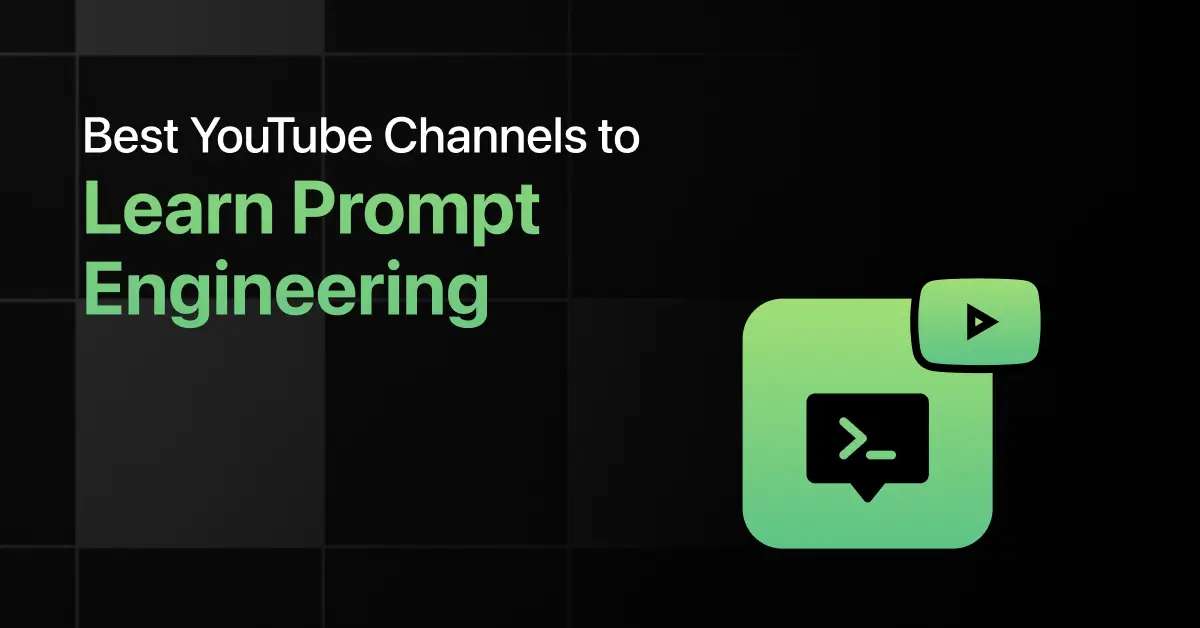

Best YouTube Channels to Learn Prompt Engineering
The rise of artificial intelligence has brought prompt engineering to the forefront, a key skill for unlocking the full potential …

